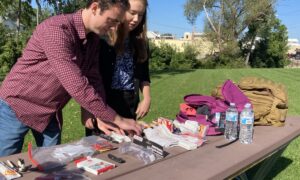UNLESS you grow your own food, your first contact with the food you eat will likely be at a market or supermarket. When you shop, how can you select and purchase healthful food?
? Plan your route.
“Shop for non-perishable food first,” advises the Food Safety Information Council in Australia. “Leave [items from] the fridges and freezers to the end of your shopping.” Also, if you are buying hot food, pick it up just before you return home.
? Favor fresh food.
Try to purchase fresh food when possible.* Ruth, a mother of two in Nigeria, says: “I usually go to the market very early in the morning when the food is fresher.” Elizabeth, from Mexico, also shops at an open market. “There I can buy fresh fruits and vegetables, and I can pick them out myself,” she says. “I always buy fresh meat slaughtered that day. If necessary, I freeze what I don’t use.”
? Inspect your food.
Ask yourself: ‘Is the skin on my produce intact? Is the meat free of unusual odors?’ If the food is prewrapped, inspect the packaging. Damaged packages can allow poisonous bacteria to enter the food.
Chung Fai, who buys food at a supermarket in Hong Kong, says: “It is also necessary to check the expiration date printed on packaged food.” Why? Experts warn that even if “expired” food looks, smells, and tastes good, it can still make you sick.
? Pack safely.
If you use a reusable shopping bag or plastic bin, wash it out frequently with hot soapy water. Carry meat and fish in separate bins or bags so they do not contaminate other food.
Enrico and Loredana, a couple in Italy, shop locally. “That way,” they explain, “we don’t have to transport food very far and risk spoilage.” If it will take longer than 30 minutes to return home, put chilled or frozen foods into an insulated bag, or in some other way, make sure it is kept cool.





